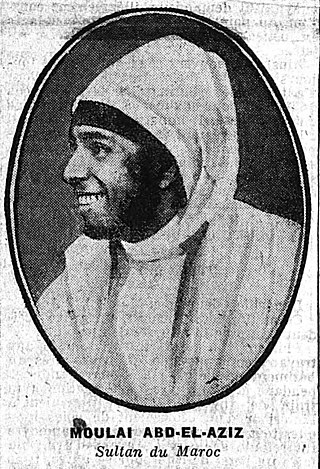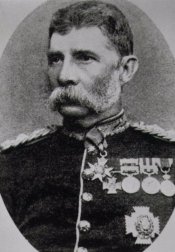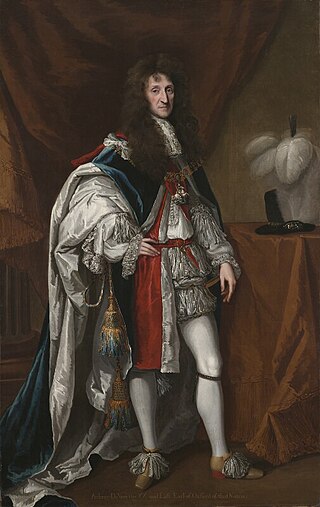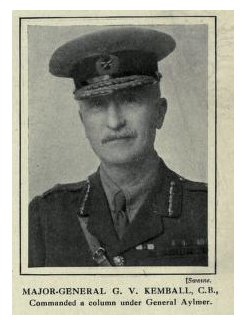Military career
Maclean was born on 15 June 1848, the eldest son of General Andrew Maclean. [1]
He began his military career in the 69th (South Lincolnshire) Regiment of Foot in 1869. He was dispatched overseas to fight the Fenians in Canada. In 1876 he resigned from his regiment, and the following year he went to Morocco and began his career as an army instructor for the Sultan Mulai Hassan. He gained the trust of the Sultan of Morocco and his successor Moulay Abdelaziz through his service and fought against opposing tribes throughout Morocco. During his career, he was kidnapped and held for ransom after a failed first attempt. He visited the forbidden city of Tafilalt, and eventually became commander of the Sultan of Morocco's Army.
Although he was loyal to his employer to a fault, he was regarded as an unofficial British agent in the United Kingdom. In June 1901 he was attached to a Special diplomatic mission from Morocco to the United Kingdom to congratulate King Edward VII on his recent accession, and the King appointed him a Knight Commander of the Order of St Michael and St George (KCMG) during the visit. [2]

Tangier is a city in northwestern Morocco, on the coasts of the Mediterranean Sea and the Atlantic Ocean. The city is the capital of the Tanger-Tetouan-Al Hoceima region, as well as the Tangier-Assilah Prefecture of Morocco.

English Tangier was the period in Moroccan history in which the city of Tangier was occupied by England as part of its colonial empire from 1661 to 1684. Tangier had been under Portuguese control before Charles II of England acquired the city as part of the dowry when he married the Portuguese infanta Catherine. The marriage treaty was an extensive renewal of the Anglo-Portuguese Alliance. It was opposed by Spain, then at war with Portugal, but clandestinely supported by France.

MoulayAbd al-Aziz bin Hassan, born on 24 February 1881 in Marrakesh and died on 10 June 1943 in Tangier, was a sultan of Morocco from 9 June 1894 to 21 August 1908, as a ruler of the 'Alawi dynasty. He was proclaimed sultan at the age of sixteen after the death of his father Hassan I. Moulay Abdelaziz tried to strengthen the central government by implementing a new tax on agriculture and livestock, a measure which was strongly opposed by sections of the society. This in turn led Abdelaziz to mortgage the customs revenues and to borrow heavily from the French, which was met with widespread revolt and a revolution that deposed him in 1908 in favor of his brother Abd al-Hafid.

General Sir Harry North Dalrymple Prendergast, was a British military officer who served with the Madras Army and the Indian Army. He was a recipient of the Victoria Cross (VC), the highest and most prestigious award for gallantry in the face of the enemy that can be awarded to members of British and, in imperial times, Commonwealth forces.

MacLean, also spelt Maclean and McLean, is a Scottish Gaelic surname Mac Gille Eathain, or, Mac Giolla Eóin in Irish Gaelic), Eóin being a Gaelic form of Johannes (John). The clan surname is an Anglicisation of the Scottish Gaelic "Mac Gille Eathain", a patronymic meaning "son of Gillean". Gillean means "the Servant of [Saint] John [the Baptist]"), named for Gilleathain na Tuaidh, known as "Gillian of the Battleaxe", a famous 5th century warrior.

Lieutenant-General Sir Edward Thomas Henry Hutton, was a British military commander, who pioneered the use of mounted infantry in the British Army and later commanded the Canadian Militia and the Australian Army.

Aubrey de Vere, 20th Earl of Oxford, KG, PC was an English peer and military officer who fought on the Royalist side during the English Civil War.
Harry Maclean may refer to:

The Church of Saint Andrew is an Anglican church in Tangier, Morocco. Consecrated in 1905, the church is within the Archdeaconry of Gibraltar. The building is constructed in a Moorish architectural style.

Qaid, also spelled kaid or caïd, is a word meaning "commander" or "leader." It was a title in the Norman kingdom of Sicily, applied to palatine officials and members of the curia, usually to those who were Muslims or converts to Islam. The word entered the Latin language as Latin: gaitus or Latin: gaytus. Later the word was used in North Africa for the governor of a fortress or the warden of a prison, also in Spain and Portugal in the form with the definite article "alcayde" or "alcaide". It is also used as a male Arabic given name.

Mulai Ahmed er Raisuni was a Sharif, and a leader of the Jebala tribal confederacy in Morocco at the turn of the 20th century. While he was regarded by foreigners and the Moroccan government as a brigand, some Moroccans, especially among the Jebala, considered him a heroic figure, fighting a repressive, corrupt government, while others considered him a thief. Historian David S. Woolman referred to Raisuni as "a combination Robin Hood, feudal baron, and tyrannical bandit." He was considered by many as "the last of the Barbary Pirates" though Barbary Coast piracy had ended by the middle of the 19th century. On the other hand, according to Douglas Porch, an American historian, Raisuni was part of the rule rather than the exception in that every successful Moroccan politician at the time combined villainy with sainthood. He died in April 1925 after having been captured and imprisoned by his rival Abd el Krim.

Major-General Sir George Vere Kemball, KCMG, CB, DSO, R.A. (1859–1941) was a British Army officer of the 19th and early 20th century. He was a career officer in the British Army spending most of his career in India and Nigeria.
Andrew Belton was a British Army officer and veteran of campaigns in South Africa and Morocco. He was an early exponent of the use of aircraft for military purposes, enrolling at the Chicago School of Aviation in April, 1911. He was an entrepreneur who registered a number of companies in the newly established Irish Free State.

Major-General Sir Francis Howard was a British Army officer in the late nineteenth and early twentieth centuries.
The Coronation Honours 1911 for the British Empire were announced on 19 June 1911, to celebrate the Coronation of George V which was held on 22 June 1911.
The Diamond Jubilee Honours for the British Empire were announced on 22 June 1897 to celebrate the Diamond Jubilee of Queen Victoria on 20 June 1897.
The 1907 Birthday Honours for the British Empire were announced on 28 June, to celebrate the birthday of Edward VII.
The New Year Honours 1925 were appointments by King George V to various orders and honours to reward and highlight good works by members of the British Empire. They were published on 30 December 1924.
The King's Birthday Honours 1934 were appointments in many of the Commonwealth realms of King George V to various orders and honours to reward and highlight good works by citizens of those countries. The appointments were made to celebrate the official birthday of The King. They were published on 4 June 1934.

Mohammed ben Ali R'bati, also known as Ben Ali Rabbati, was a Moroccan painter and cook who was described as "the father of Moroccan painting". He was known for his blend of traditional influences with European-style art with his paintings mainly revolved around life in the city of Tangier, where he was lived.















